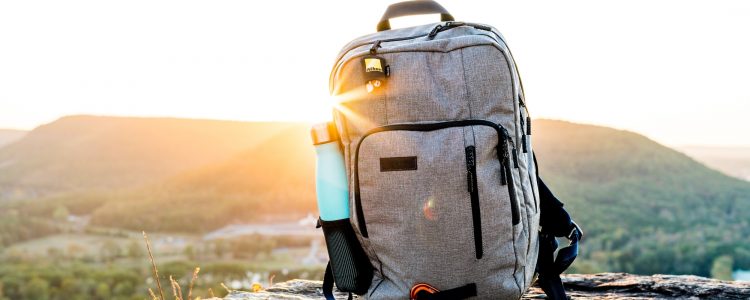It’s not the most exciting aspect of travel to prepare for, but thefts and losses are common amongst travellers and it’s important to take care to protect your gear. Here are a few of our top tips for keeping your belonging safe when backpacking. Learn them before you go to help put your mind at ease.
Pack light
On top of making it easier to lug your travel bags around, packing light has a few other unexpected benefits. It makes you really consider what you need and decide which valuables are better off staying at home. Think about whether you’ll really need each of your more expensive items and how yoou’d feel if you had to replace them.
Long haul travellers will often find themselves on coach, boat or train journeys where big luggage has to be placed in out of sight areas or even on a roof making that brand new and expensive 70 litre trekking pack, often packed to the brim, stick out like a sore thumb. Pack light to keep your bag at 45 litres or less so you can keep it with you most of the time; under your seat or on the bed with you on a sleeper train. Overnight journeys can be hard enough without having to worry about your bags when they’re out of reach.
Out Of Sight
It’s best not to flaunt valuables in any part of the world and when there is nowhere to safely store your belongings, you’re better off just leaving them at home. Just the thought of that £1000 laptop you’ve hidden under the hotel room bed going missing is enough to add unnecessary stress to your trip. Unless your belongings are on you, you can’t be sure they’re safe. Leave behind anything you can do without – it will put your mind at ease!
Obviously, there’s some valuables you’ll have to have with you; passports, cards, currency. A good way to keep these small items safe is with an out of sight money belt or passport pouch that always stays securely on your body. A good tip for cash is to keep just a day’s worth of money in your wallet or purse and the remainder hidden away in your money belt – no one needs to see all your travel money every time you pay for something. For larger items like cameras and laptops that you’re not comfortable with leaving at the hotel, make sure you have a secure day pack that has specially design compartments to keep them out of sight as you reach for items throughout the day.
Lock It Up
Along with the ones used on your luggage, pack an extra padlock to ensure your hotel room or dorm locker are inaccessible by anyone else. You’ll often find yourself given a flimsy old padlock in budget accommodation or nothing at all so it’s best to be prepared. A cable lock will secure your bags to a bedpost or radiator and gives you some extra protection for long journeys, too.
Invest In Good Gear
When preparing to go travelling make sure you invest in good quality products. Waterproof and slash-proof bags will ensure your belongings will withstand the abuse of the elements as well as giving you some extra protection from thieves. High quality locks and accessories will last longer and do their jobs better. Even budget travellers should keep this in mind as it can save you money in the long run if a better quality lock saves you having to replace valuables.
Get Insured & Back Up Documents
Insurance is by far the most boring expenditure on your trip but one of the most important. Chances are you and your belongings will be fine however, if the worst does happen insurance that covers everything you’re doing on your trip will ensure you wont be out of pocket. There are tons of different companies offering travel insurance which can be signed up to in minutes – so there’s no excuse!
Another boring but vital consideration is for you valuable documents. Keep them safe by using secret compartments in your luggage and keeping them on you when you can. Copies of passports, visas and cards should be available and kept away from originals in case of theft and always accessible. Use your email and cloud storage to keep digital copies of important documents so you can access them from anywhere. secret compartments and friends/family members. If you lose your passport these techniques will definitely help speed things up when you try and get emergency documents.


No Comments
Be the first to start a conversation